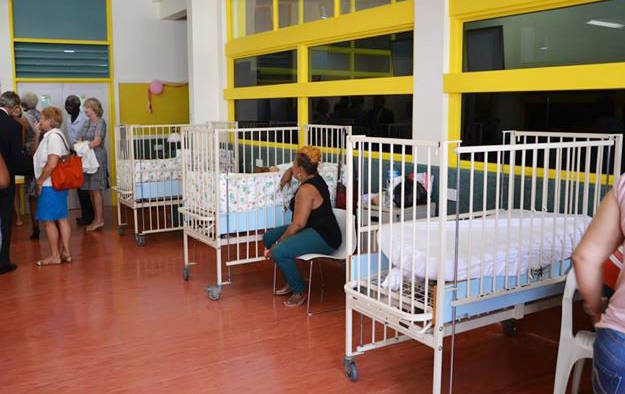The refurbished Paediatric Ward at Milton Cato Memorial Hospital (MCMH), which includes more beds and an expanded Critical Care Unit, was officially reopened on Monday.
Speaking at a ceremony at the hospital, Minister of Health, Clayton Burgin noted that the EC$1.2 million upgrade is part of a multi-phase renovation of the ward.
He said the upgrade includes the addition of 11 paediatric beds, taking the number to 36, and a neonatal intensive care unit.
The ward’s outpatient clinic zone has been upgraded to a six-bed paediatric critical care unit that includes one burn unit bed, with staff bathroom facilities and storage facilities in that area.
The general paediatric critical care unit has been increased to a 10-bed area and the ward now has separate bathrooms for male and female patients, a larger dining area to also accommodate relatives, and office facilitates for the medical practitioners.
Burgin said the ward also has new and additional lighting, fans, a suspended ceiling, an upgraded neonatal insensitive care unit, and new medical equipment and furnishing.
The ward was refurbished with support from the World Paediatric Project (WPP), which began a partnership with MCMH 12 years ago, that has seen 63 teams performing 667 surgeries.
Additionally, 220 children were treated at WPP hospitals in the United States. Of those children, 112 had open-heart surgeries and 16 with brain tumours.
“All in all, US$43 million worth of service have been provide to the 3,500 children we have seen over the years,” said president of WPP Susan Rickman, who praised the “remarkable” government of Ralph Gonsalves for welcoming the WPP programmes and allowing children from the eastern Caribbean to access and benefit from the services that WPP is providing.
Meanwhile, Prime Minister Ralph Gonsalves likened the WPP to the Good Samaritan.
“Our world has so much which is harsh and unconscionable, but then this great thing of beauty comes by, called the World Paediatric Project — of immense helplessness, Good Samaritans.
He said since 2002, the value of the services provide by the WPP in St. Vincent is US$15.8 million.
“These numbers do not appear in the gross domestic product figures, but these are real to real flesh and blood people,” Gonsalves said.
Gonsalves also noted the contribution of the Mustique Charitable Trust to the healthcare sector in St. Vincent and the Grenadines.
During Monday’s ceremony, businessman Simon Kamara, chief executive officer of Liberty Properties Inc., donated a 40-inch colour television to be used by patients on the ward.







Great to hear about the recent upgrading of the Paediatric Ward at the MCMH. I hope this will lead to much improvement in the care provided for children and their families.
Hearing about this improvement took me back to my time there as a HCA in the late 1960s,struggling to care for about 20 or more sick children while waiting for the Staff Nurse to arrive on night duty.
The MCMH remains one of the worst government hospitals in the Caribbean.
No one — from the PM and his family down — who can afford to do otherwise goes there for treatment. Every day, Vincentians who have the money to do so fly to Barbados, Trinidad, England, America, and Canada, even to seek treatment for non-lethal medical issues.
This is because there is an absence or inadequate level of specialized surgical and other treatment in most areas here at home. The result is that the mortality rate of those who seek treatment is very high. Many people even say going to the MCMH is a near death sentence. While this may be an exaggeration, it is clear that infection rates are very high due to poor hospital hygiene, overcrowding, a lack of basic supplies, etc. while recovery rates are very low due to poor diagnose and absent, inadequate or incompetent treatment. Many people say it is far better to die at home surrounded by loved ones.
Sad to say, the current regime seems to believe that it can gain far more voters building an international airport at Argyle than in giving ordinary Vincentians — people who can’t afford to go to other countries for medical treatment — an adequate system of health care in their homeland.